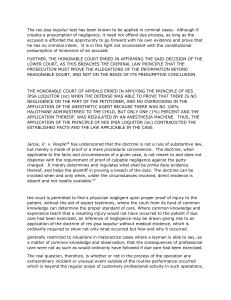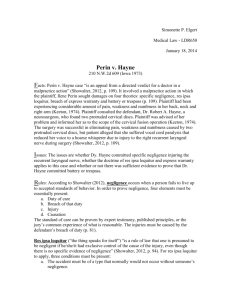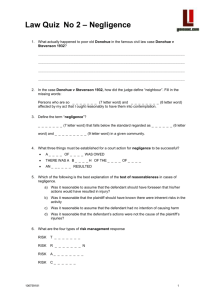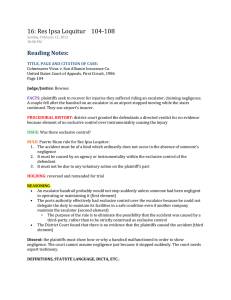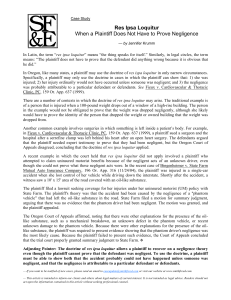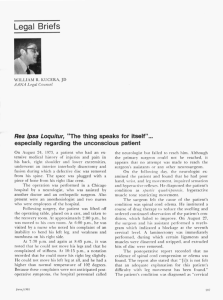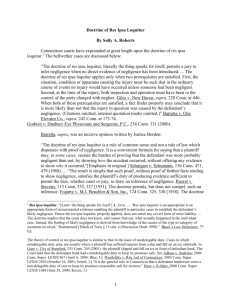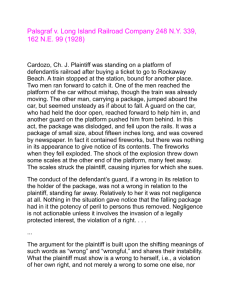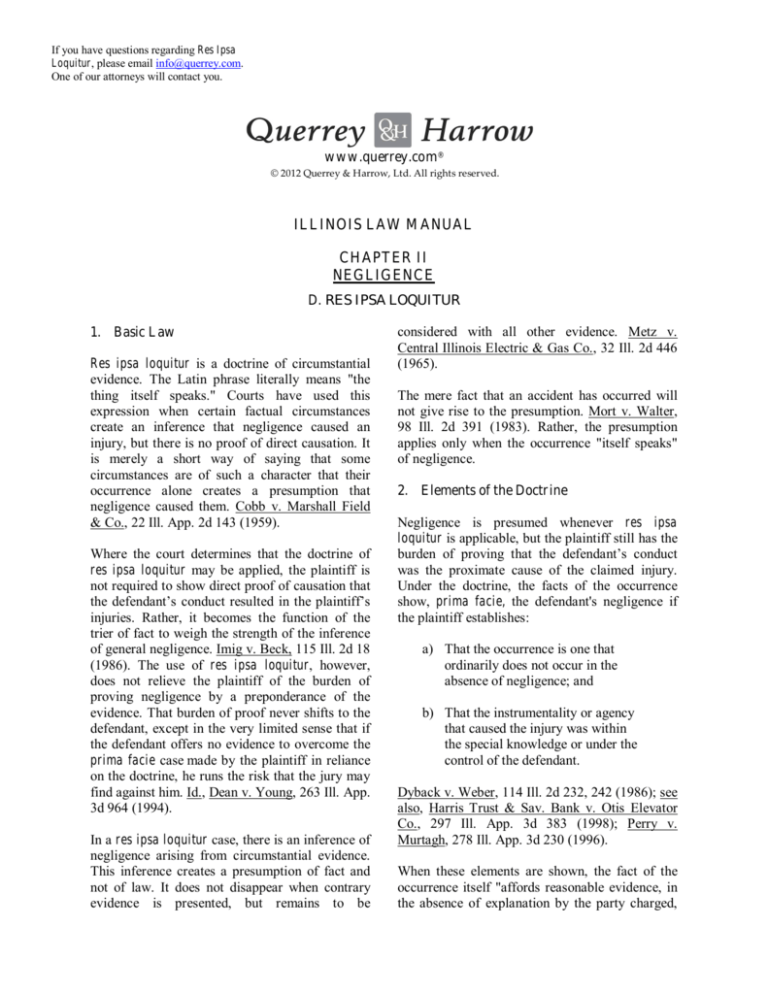
If you have questions regarding Res Ipsa
Loquitur, please email info@querrey.com.
One of our attorneys will contact you.
www.querrey.com®
© 2012 Querrey & Harrow, Ltd. All rights reserved.
ILLINOIS LAW MANUAL
CHAPTER II
NEGLIGENCE
D. RES IPSA LOQUITUR
1. Basic Law
Res ipsa loquitur is a doctrine of circumstantial
evidence. The Latin phrase literally means "the
thing itself speaks." Courts have used this
expression when certain factual circumstances
create an inference that negligence caused an
injury, but there is no proof of direct causation. It
is merely a short way of saying that some
circumstances are of such a character that their
occurrence alone creates a presumption that
negligence caused them. Cobb v. Marshall Field
& Co., 22 Ill. App. 2d 143 (1959).
Where the court determines that the doctrine of
res ipsa loquitur may be applied, the plaintiff is
not required to show direct proof of causation that
the defendant’s conduct resulted in the plaintiff’s
injuries. Rather, it becomes the function of the
trier of fact to weigh the strength of the inference
of general negligence. Imig v. Beck, 115 Ill. 2d 18
(1986). The use of res ipsa loquitur, however,
does not relieve the plaintiff of the burden of
proving negligence by a preponderance of the
evidence. That burden of proof never shifts to the
defendant, except in the very limited sense that if
the defendant offers no evidence to overcome the
prima facie case made by the plaintiff in reliance
on the doctrine, he runs the risk that the jury may
find against him. Id., Dean v. Young, 263 Ill. App.
3d 964 (1994).
In a res ipsa loquitur case, there is an inference of
negligence arising from circumstantial evidence.
This inference creates a presumption of fact and
not of law. It does not disappear when contrary
evidence is presented, but remains to be
considered with all other evidence. Metz v.
Central Illinois Electric & Gas Co., 32 Ill. 2d 446
(1965).
The mere fact that an accident has occurred will
not give rise to the presumption. Mort v. Walter,
98 Ill. 2d 391 (1983). Rather, the presumption
applies only when the occurrence "itself speaks"
of negligence.
2. Elements of the Doctrine
Negligence is presumed whenever res ipsa
loquitur is applicable, but the plaintiff still has the
burden of proving that the defendant’s conduct
was the proximate cause of the claimed injury.
Under the doctrine, the facts of the occurrence
show, prima facie, the defendant's negligence if
the plaintiff establishes:
a) That the occurrence is one that
ordinarily does not occur in the
absence of negligence; and
b) That the instrumentality or agency
that caused the injury was within
the special knowledge or under the
control of the defendant.
Dyback v. Weber, 114 Ill. 2d 232, 242 (1986); see
also, Harris Trust & Sav. Bank v. Otis Elevator
Co., 297 Ill. App. 3d 383 (1998); Perry v.
Murtagh, 278 Ill. App. 3d 230 (1996).
When these elements are shown, the fact of the
occurrence itself "affords reasonable evidence, in
the absence of explanation by the party charged,
that it arose from want of proper care.”Metz, 32
Ill. 2d at 449. The defendant can rebut the
presumption of negligence by explaining some
other rational cause for the occurrence or by
showing that the instrumentality which caused the
damages/injuries was not under the defendant's
control at the time of the occurrence.
In some situations, the act itself "speaks
negligence," yet the doctrine will not be applied
because of a missing element. Loizzo v. St.
Francis Hospital, 121 Ill. App. 3d 172 (1984),
provides an example. Plaintiff had been treated for
a heart condition for a number of years and, in
1977, discovered that a 12-inch catheter had been
left in his heart. Plaintiff, who had been treated at
more than one hospital and by more than one
doctor, could not say which doctor or which
hospital had failed to remove the catheter.
Plaintiff sued all of the doctors and hospitals that
had recently treated him for his heart condition
and attempted to invoke the res ipsa loquitur
doctrine. Plaintiff argued that all of these entities
had exclusive control of him and that, although he
could not say which one actually did it, one of
them must have left the catheter in his body.
3. Analysis
Some of the more common examples of the
application of res ipsa loquitur include:
a) Fires that occur in an area of the
premises where the defendant is in
exclusive control and the fires are not
of the type which ordinarily happen
in the absence of negligence. If the
plaintiff could not have reasonably
prevented the fires from damaging
his property, the doctrine will be
applied; and
The trial court granted summary judgment to all
defendants because plaintiff was unable to show
that they had control of the catheter or were acting
jointly, because the treatment was performed by
different entities at different times and at different
locations. The appellate court affirmed the trial
court's decision and ruled that the defendants
necessarily did not act together. Thus, even if the
plaintiff could show that one of them must have
left the catheter inside of him, he could not satisfy
the element of exclusive control. Hence, the
doctrine did not apply. Id. at 180.
b) In a hospital when a patient is
discovered to have sustained an
injury at a time when the patient
was in the exclusive care of the
hospital personnel and, because of
his incapacity or incompetence,
could not have negligently injured
himself, a presumption of the
hospital's negligence will arise.
Querrey & Harrow, Ltd.
175 W. Jackson Blvd., Suite 1600, Chicago, IL 60604
www.querrey.com
-2-


